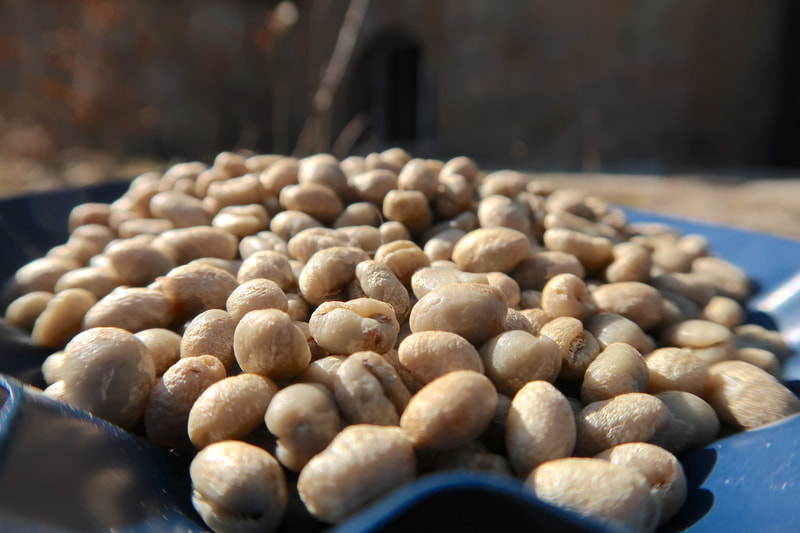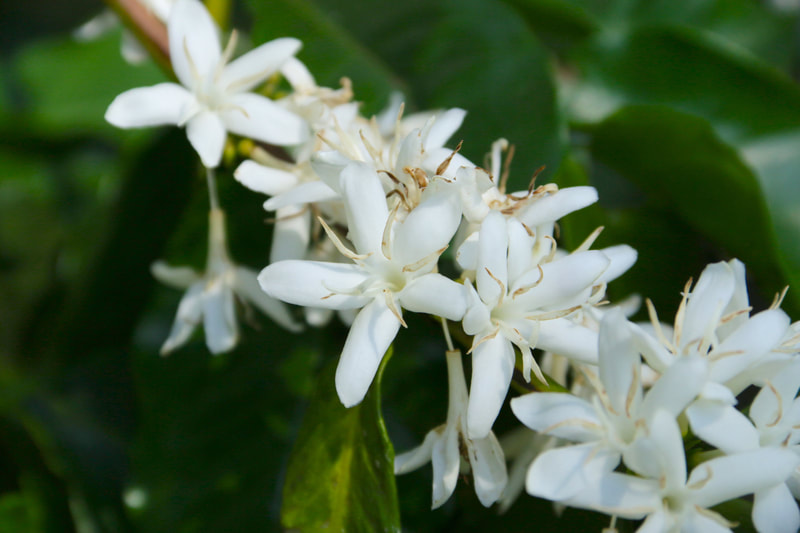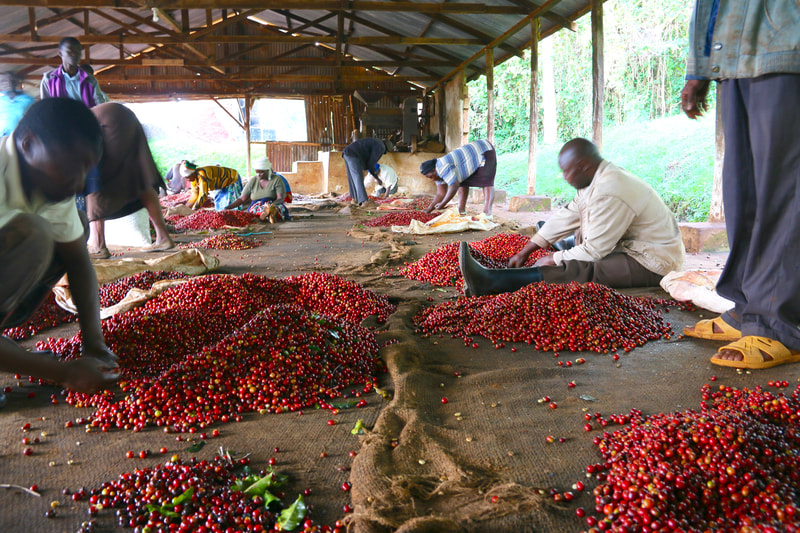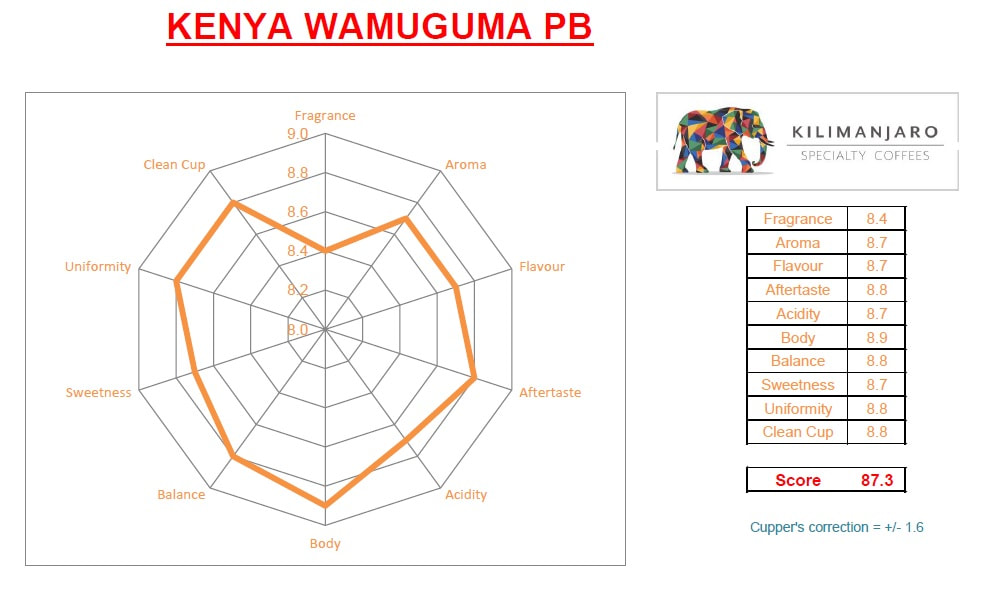KENYA WAMUGUMA PB
General Information
|
Origin: Kenya
County: Kiambu Cooperative: Ritho FCS Washing Station: Wamuguma Farmers: 2548 active members Cultivar: SL28 - SL34 Altitude: 1600 - 1800 masl Process: Fully washed with double fermentation Harvest: November 2020 - January 2021 Cherry Price | FOB Price: No info | 8.83 USD/Kg Screen | Moisture | Density: PB | 9.8% | 0.702 g/ml Packaging: 30 Kg + GrainPro Score: 87.3 Notes: Plum, maple syrup, red grape, orange Ikawa profile: KSC basic profile 50g #2 |
TRACEABILITYWamuguma is a washing station or factory (as they are commonly called in Kenya), located in the city of Gatundu, in the extreme north of Kiambu County, near the border where Muranga County begins. Kiambu coffees are our favorites in Kenya, although they are not as "famous" as those from Nyeri or Kirinyaga, but they always stand out with intensely sweet profiles, complex phosphoric acidity, and floral notes, especially reminding us of the flavour of tree tomato fruit.
The altitude of Wamuguma ranges between 1600 - 1800 masl and enjoys an average annual rainfall of 1098 mm. There are bimodal rain patterns that bring two wet seasons per year (hence 2 blooms and two harvests per year). The main harvest runs from November to January. The area is privileged by its red clay soil, rich in nutrients and organic matter. The Wamuguma factory together with the Handege factory form the Ritho FCS. This coop was founded in 1972, it currently has 2,548 active members, who in 499 hectares produce a total of 43,038 kg of green coffee per year. After harvesting, the coffee cherry is delivered to the factory, where it undergoes a fully washed or wet processing method with double fermentation. Water is pumped from the Thiririka river to reservoir tanks for pulping and recirculation. After pulping, the coffee is dry fermented overnight, before it's washed in grading channels, then soaked for 24-48 hours in clean water, and finally spread out on raised beds for selection and sun drying. Wamuguma is named after a local dignitary named Muguma, who loved coffee so much that he generously supported the local community in their coffee endeavors. HISTORYDespite its proximity to Ethiopia, coffee was not cultivated in Kenya until 1893, when the "Fathers of the Holy Ghost" (French catholic missionaries), introduced coffee trees from Reunion Island and planted them near Mombasa.
** Interesting Fact: The Bourbon variety was first cultivated on a small island that today is known as "Reunion Island". It is located in Africa, in the Indian Ocean, east of Madagascar. It is considered a region of France and until 1789 its name was "Bourbon Island", in honor of the royal house of the Bourbons. ** In 1896, the first plantations were introduced in Kiambu - Kikuyu district, a very fertile area, which in 1912 already saw large plantations of several acres of expansion; there were mainly cultivated Bourbon and Mokka varieties. While credit for the introduction of coffee in Kenya corresponds to Catholic missionaries, were the English settlers, who accelerated the importance of coffee in the Kenyan economy. Large-scale production of coffee and other crops, were heavily increased to export them into Europe, in order to pay the exorbitant debts generated by the construction of the railway connecting Uganda with the port of Mombasa in 1901. After Kenyan independence from the British Empire in 1963, the long experience and extensive knowledge about coffee production was very well adopted by small local farmers, resulting in the high quality standards with which today Kenyan coffee is known in the world. VARIETIESThere are two particular varieties that attract most of the interest from specialty coffee buyers in Kenya, these are: SL 28 and SL 34.
The Scott Laboratories were hired to develop new cultivars between 1934 and 1963. The development of cultivars SL, was based on the Mokka and Bourbon varieties, which were introduced into Kenya by Scottish and French missionaries, from Yemen and Reunion Island respectively. Today, these two varieties are responsible for most of the top quality coffees produced in Kenya, but they are susceptible to coffee leaf rust and other diseases. Kenya has done a huge job, trying to find disease resistant varieties. The "Ruiru 11" was the first variety to be considered a success by the "Kenyan Coffee Board". Unfortunately, it has not been well received by importers and the specialty coffee industry in general. By the end of 2010, a new variety called "Batian" rust resistant, and which some say has a better cup than "Ruiru 11", was introduced. We will still have to wait a few more years to know its full potential in the cup and productivity. |
THE PROCESS
wamuguma FACTORY LOCATION
|
WHERE WE ARE
Barcelona, Spain Santiago, Chile Budapest, Hungary |





